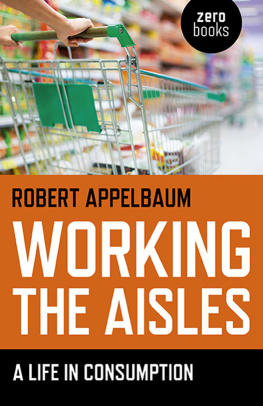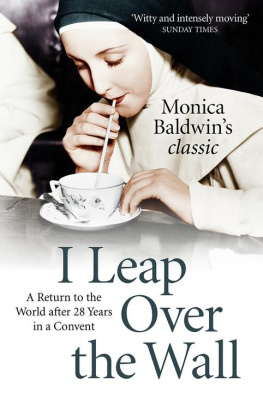For distributor details and how to order please visit the Ordering section on our website.
All rights reserved. Except for brief quotations in critical articles or reviews, no part of this book may be reproduced in any manner without prior written permission from the publishers.
The rights of Robert Appelbaum as author have been asserted in accordance with the Copyright,
Designs and Patents Act 1988.
A CIP catalogue record for this book is available from the British Library.
We operate a distinctive and ethical publishing philosophy in all areas of our business, from our global network of authors to production and worldwide distribution.
Chapter One
Working the Aisles
The first thing you have to remember when you walk down the aisles of your local supermarket is that they do not love you.
Yet it is easy to be mistaken about this. You come through the sliding glass doors of the market and into a vast hangar of a space, brilliantly lighted, open, free, and everywhere you go there is nothing but good things to eat. Oranges. Chocolate milk. Bread. Rows of corn oil, olive oil, mayonnaise, breakfast cereal, meat whole hunks of it, and chopped up bits of it, sliced bits, soft bits, ready seasoned if you want it that way, or else raw, bloody, ready to be torn into and gnawed. It is easy to think that you have arrived at a sublime and adult version of the time when you would sit in your high chair, in the family kitchen, and they fed you your first pulpy mashes and liquids. All you have to do is move about and load up your basket, as if mom was making like an aeroplane and zooming mouthfuls of pureed bananas and rice into your mouth. Even the commodities there that are not for eating bring you back to earliest infancy. Plates to feed from. Toilet paper. Napkins. Medications. Nostrums for headaches, stomach aches, ear aches, itchy skin, pimply skin, sore gums, insomnia, nightmares its all there, to take away the pain, the itch, the fearful feelings. Mom and Dad are missing, but they have their surrogates stationed throughout the store, with uniforms and name tags to point them out. They are at your service. If you are in San Diego, California where I first learned many of my lessons in supermarket lore as you leave the store, loaded up with more than you will need in plastic bags the size and colour of birthday balloons (having decided on having plastic rather than paper, a double bagging rather than a single bagging), the clerks will wish you to have a nice day, the scent of suntan oil and hair conditioner smiling from their clean, bronze bodies, and the look of a smiley face in their well meaning grins. How nice! The sun hits you as you leave and ocean air drifts into your nostrils. If you are in Northwest England, where I lived until recently for a number of years, you will get a little Bye now! to send you on your way, and if that isnt enough if, for example, you havent made it off from the check-out counter yet, so that although the clerks have said goodbye you are still there and need to be talked to some more, and this is in a part of the world where people find it hard to take leave of one another you will also get a Cheers! Ta! Thanks! Buh-bye! See you now! Bye!, and if your clerk is female and of a certain age you will get a soft Bye, luv! to put you in the mood, and the scent of a spring rain, or a summer rain, or an autumn rain, or a cold blustery winter rain, to greet you outside the door. Cheers! you respond in kind. Ta! Buh-bye! See you! Buh-bye now! Bye!
But they do not love you at the supermarket, and you are going to have to get used to it. Elsewhere in the world of everyday commerce you may still happen upon the possibility of finding something like love: at a lingerie shop, say, or a neighbourhood restaurant with white lace curtains, or a farmers market set up outside in a gravelly car park, where the actual farmers come, and theyre dying for human contact and tax-free income. I once stumbled upon a modest place with outdoor tables in an ancient alleyway in old Nmes. It was called the Restaurant de Provence. Already you might be a suspicious of the establishment, since Nmes is in Languedoc, not Provence, and even though Provence is only 20 miles away you may have reason to believe you are being had. But not to worry. The restaurant was run by a middle-aged patron and a thirty-something female chef in the spirit of a cultural exchange: come to us with your hometown Languedoc euros, the restaurant suggested, and we will give you something you cant always get in these parts! And in fact, though my dinner started out with a characteristic dish of Nmes, a brondade de morue, offered I suppose in the spirit of ecumenism, my companion ordered a soupe de poisson, one of Provences most famous dishes. It didnt have any fish in it, we were surprised to find out. We thought we were going to get something like a rudimentary bouillabaisse, with maybe a couple of mussels or clams and a bit of monkfish idling in a chunky chowder, but it was only a bowl of thick fishy broth, served with a few thin slices of cold toasted bread rounds and a peeled clove of raw garlic. We looked at it, we sniffed it. My companion, a visitor from California, gave me a look so as if to say, I didnt fly six thousand miles to the south of France for a cup of Campbells and a crouton. But the proprietor, noting our annoyance, came over to the table with the solicitude of kindergarten teacher floating to the side of a fallen five-year-old girl, grimacing over a scraped knee. He ambled up to the side of my companion and whispered to her in French, Have you had this before? Me, I wanted to lie, Of course I have, Im no tourist, you know--My companion didnt even know what he was saying. So while I started to mumble my Yes, kind of and she blinked at me for help, the proprietor reached his arms around my companion, taking a crouton in one hand and the garlic clove in another. Regardez, he said. His arms still around her, his cheek brushing against her hair, he rubbed the garlic clove against the crouton, describing a little circle of garlic juice on the bread. Like this, he said comme a, which even my companion understood. Then he dropped the crouton in my companions soup, and pointed to the spoon at the side of the soup bowl. It was only after my companion picked up her spoon, paddled into her soup, and placed some broth and a bit of the crouton into her mouth and smiled in return, signifying pleasure, that the proprietor backed away, patting my companions shoulders and wishing us both a bon apptit.
And this, I submit, was love.
The proprietor loved us, unconditionally, not because of who we were but because we were his clients, and not because he needed anything from us, though our patronage was necessary to him in other respects, but because he loved loving his clients. He loved to love. He loved to love through the medium of serving food to strangers. And why not?
Maybe you dont believe that. Maybe youre cynical and you think it was all an act. But it is through little gestures like this that a nation of sixty million continues to try to feed itself and its hoards of tourists as well as it does, with solicitude even to the scrape of a clove of raw garlic on a crouton. The mothers and fathers and waiters and cooks have to love what they are doing, and have to love giving and receiving love in doing what they do, or else that cant do what theyre doing at all. And so the proprietor loved us.












